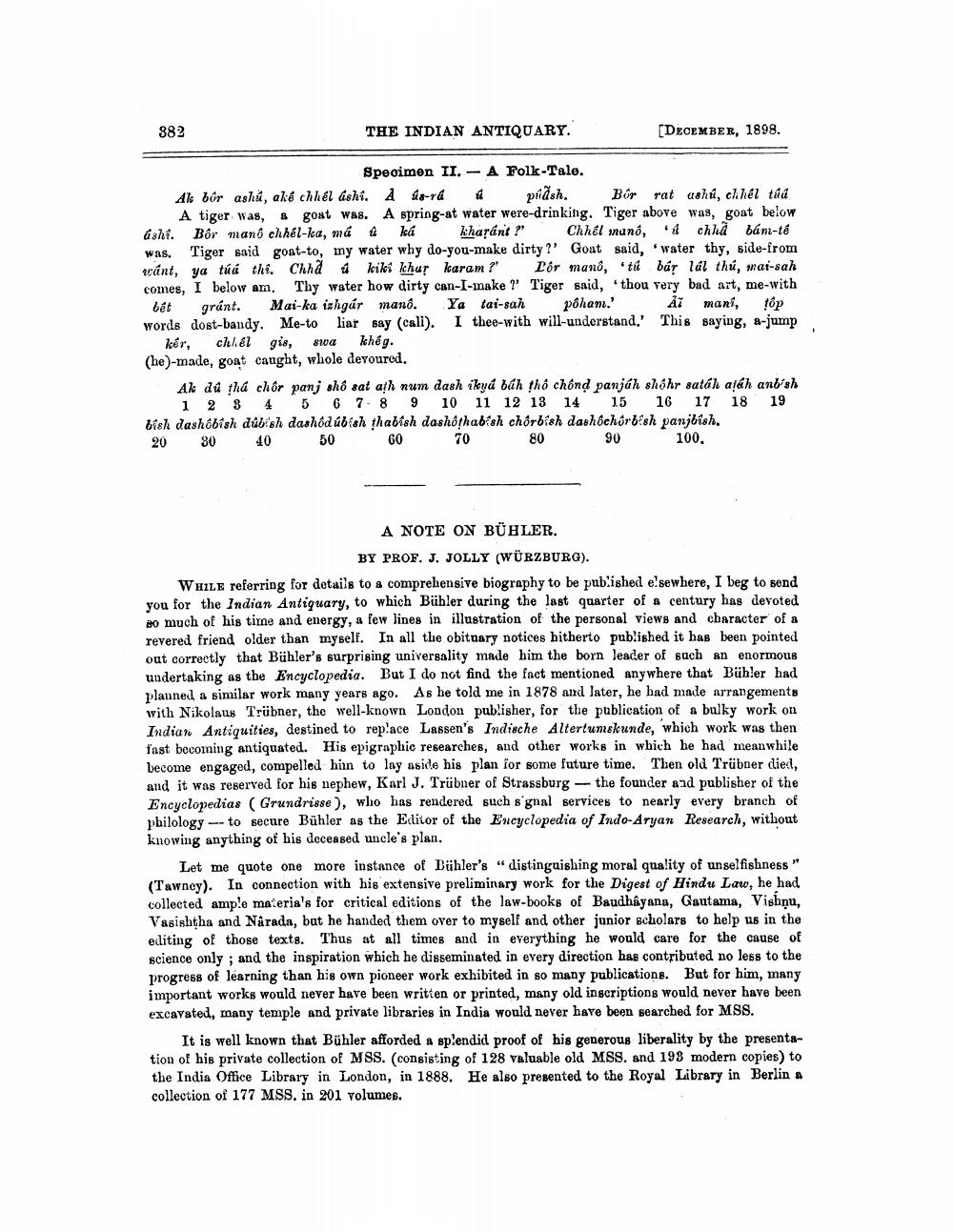________________
882
THE INDIAN ANTIQUARY.
[DECEMBER, 1898.
Specimen II. - A Folk-Tale. Ak bôr ashú, aké chhél áshi. A i-ra
prish. Bộr rat ashú, chhél tad A tiger was, & goat was. A spring-at water were-drinking. Tiger above was, goat below áshi. Bôr mano chhél-ka, má ká k haránt ?" Chhel mano, chã bán-te was. Tiger said goat-to, my water why do-you-make dirty?' Goat said, water thy, side-from rcánt, ya túá thi. Chha kiki khas karam?' Lôr mano, tú bár lá thú, mai-sah comes, I below am. Thy water how dirty can-I-make ?' Tiger said, thou very bad art, me-with
bet gránt. Mai-ka izhgár mano. Ya tai-san pham. År mani, top words dost-bandy. Me-to liar say (Cali). I thee-with will understand.' This saying, a-jump
ker, chlélgis, swa khég. (he)-made, goat caught, whole devoured.
Al đa tha chon panj shố gat ath nem daeh ikua bẩh thô chồng panjah shihr satal aid also
1 2 3 4 5 6 7 8 9 10 11 12 13 14 15 16 17 18 19 bish dashbish danish dashod úb(sh thabish dashóthabesh chorbish dashochorofsh panjbish. 20 30 40 50 60 70
80
90 100.
A NOTE ON BÜHLER.
BY PROF. J. JOLLY (WÜRZBURG). WHILE referring for details to a comprehensive biography to be pub ished e!sewhere, I beg to send you for the Indian Antiquary, to which Bühler during the last quarter of a century has devoted Bo much of his time and energy, a few lines in illustration of the personal views and character of a revered friend older than myself. In all the obituary notices hitherto published it has been pointed out correctly that Bühler's surprising universality made him the born leader of such an enormous undertaking as the Encyclopedia. But I do not find the fact mentioned anywhere that Bühler had planned a similar work many years ago. As he told me in 1878 and later, he had made arrangements with Nikolaus Trübner, the well-known London publisher, for the publication of a bulky work on Indian Antiquities, destined to replace Lassen's Indische Altertumskunde, which work was then fast becoming antiquated. His epigraphic researches, and other works in which he had meanwhile become engaged, compelled hiin to lay aside his plan for some future time. Then old Trübner died, and it was reserved for his nephew, Karl J. Trübner of Strassburg - the founder and publisher of the Encyclopedias (Grundrisse), who has rendered such s gnal services to nearly every branch of philology -- to secure Bühler as the Editor of the Encyclopedia of Indo-Aryan Research, without knowing anything of his deceased uncle's plan.
Let me quote one more instance of Bühler's “distinguishing moral quality of unselfishness" (Tawney). In connection with his extensive preliminary work for the Digest of Hindu Law, he had collected ample materials for critical editions of the law-books of Baudhayana, Gautama, Vishnu, Vasishtha and Narada, but he handed them over to myself and other junior scholars to help us in the editing of those texts. Thus at all times and in everything he would care for the cause of science only; and the inspiration which he disseminated in every direction has contributed no less to the progress of learning than his own pioneer work exhibited in so many publications. But for him, many important works would never have been written or printed, many old inscriptions would never have been excavated, many temple and private libraries in India would never have been searched for MSS.
It is well known that Bühler afforded a splendid proof of his generous liberality by the presentation of his private collection of MSS. consisting of 128 valuable old MSS. and 193 modern copies) to the India Office Library in London, in 1888. He also presented to the Royal Library in Berlin A collection of 177 MSS. in 201 volumes.




